The Best Movies of 2023
From spring horror to end of year awards contenders, and all the Barbenheimer in between, here are the best films of 2023 as voted on by our staff.
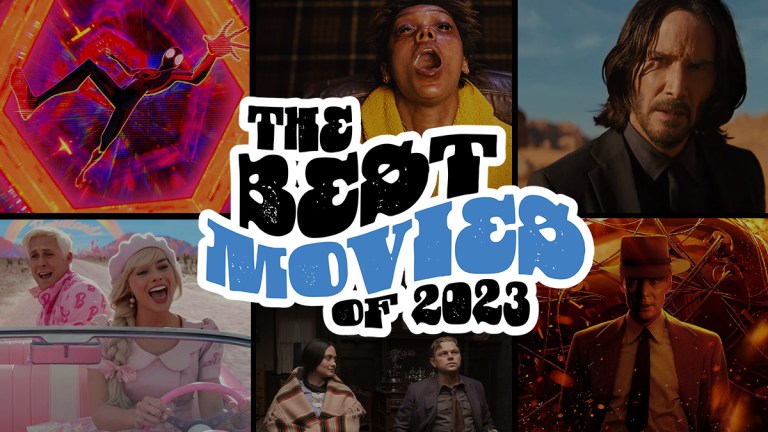
It is fair to say 2023 did not go the way many of us expected, perhaps especially those in the film studio conference rooms. This time last year, the prospect of Greta Gerwig’s curious dance with intellectual property opening on the same day as Christopher Nolan’s talky, three-hour biopic about the Father of the Atomic Bomb seemed like a double-header risk. Yet on the other side of the Barbenheimer phenomenon, Barbie and Oppenheimer stand as the highest and third highest grossing films of the year, respectively. Meanwhile many of the perceived blockbuster sure things in long-running franchises failed to take off.
That is likely the biggest story in the world of cinema circa 2023, but it is far from the only one. The wider industry appears to be in a continued state of upheaval and transition. Original horror movies with fresh concepts (or at least scares) remain the darlings of Generation Z while superhero movies increasingly look like the “dad movies” of the 2020s; the first dual writers and actors guild strikes since 1960 wreaked havoc on the release calendar and forced studios to make long overdue concessions to their actual creatives in the Age of Streaming and the imminent Age of A.I.; and no one is exactly sure what audiences want right now. But the uncertainty is creating an air of excitement and anticipation.
It’s a strange time at the movies, but one filled with treasure for those who still venture up into those hills. Hence we at Den of Geek have polled more than 30 members of our staff to get an idea about what kind of films are tickling our fancy right now. Below you will find a consensus list that includes everything from some of the finest achievements in superhero and animation filmmaking ever attempted to audacious first time films full of voice and verve. It’s just our collective opinion, but one we hope finds merriment with you and yours here at the end of all things 2023.
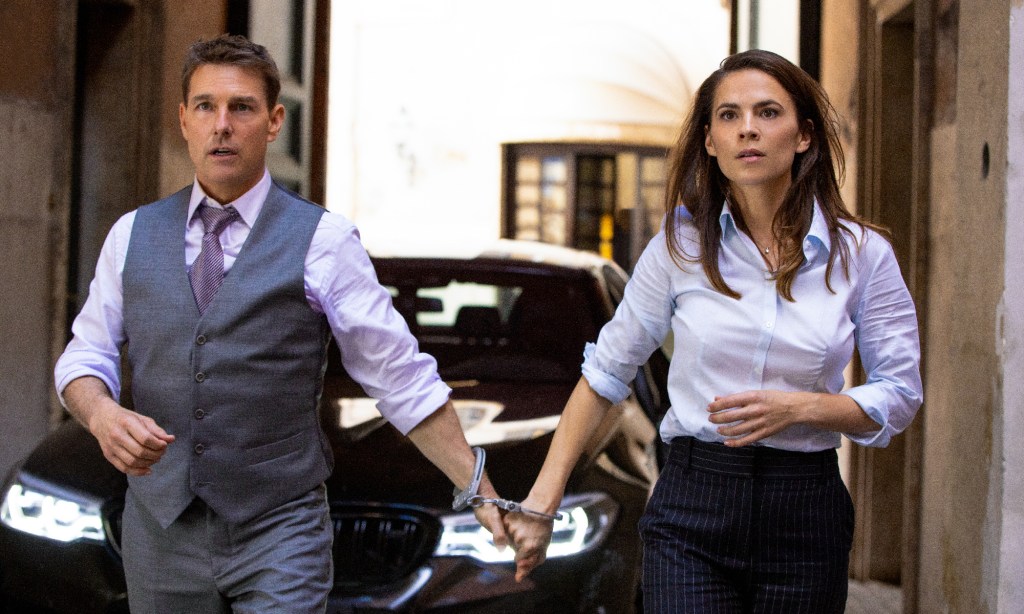
25. Mission: Impossible – Dead Reckoning Part One
It’s no secret that Tom Cruise, like so many action stars, has a habit of defying the laws of physics in his films. For instance, we doubt anyone else could survive landing their parachute glider on top of a speeding train like he does in Mission: Impossible – Dead Reckoning Part One (a film far lighter and sprightly than its unwieldy title suggests). More impressive still is how Cruise and the Mission films continue to defy the laws of Hollywood gravity too. Despite being nearly 30 years old, these movies generally get better with nearly every installment.
Yet while Dead Reckoning individually does not quite reach the heights of 2018’s Mission: Impossible – Fallout, the film is a monumental cut above almost every other action spectacle released in cinemas this summer, with Cruise and his ideal partner in crime, director Christopher McQuarrie, pushing the envelope of what can be done via in-camera stunt work and special effects to a new level of excellence. The movie also does a superb job of creating instantly compelling and enigmatic new characters, including the series’ latest addition of Hayley Atwell as a thief with a heart of gold. Pound for pound, there is no action series out there as visually dynamic or inventive than the one where Cruise drives a motorcycle off a cliff for your viewing pleasure.

24. Rye Lane
The directorial debut of Raine Allen-Miller, Rye Lane is a vibrant rom-com that respects its forebears but builds on genre trappings to create something that feels wonderfully fresh. Set in sunny South London, Yas (Vivian Oparah) is a fledgling costume designer who meets Dom (David Jonsson) at an art exhibition (featuring solely pictures of mouths…). He’s crying in the unisex bathroom, having been cheated on by his longterm girlfriend. Yas takes pity on him (initially) and the two spend a Before Sunrise-esque day hanging around Rye Lane Market, Brixton and Peckham, getting to know each other. They share stories and get up to capers (surrounding the reclamation of a record). Brightly colored and both genuinely funny and romantic, it’s a deceptively simple film that captures the spirit of the capital and will capture the heart.
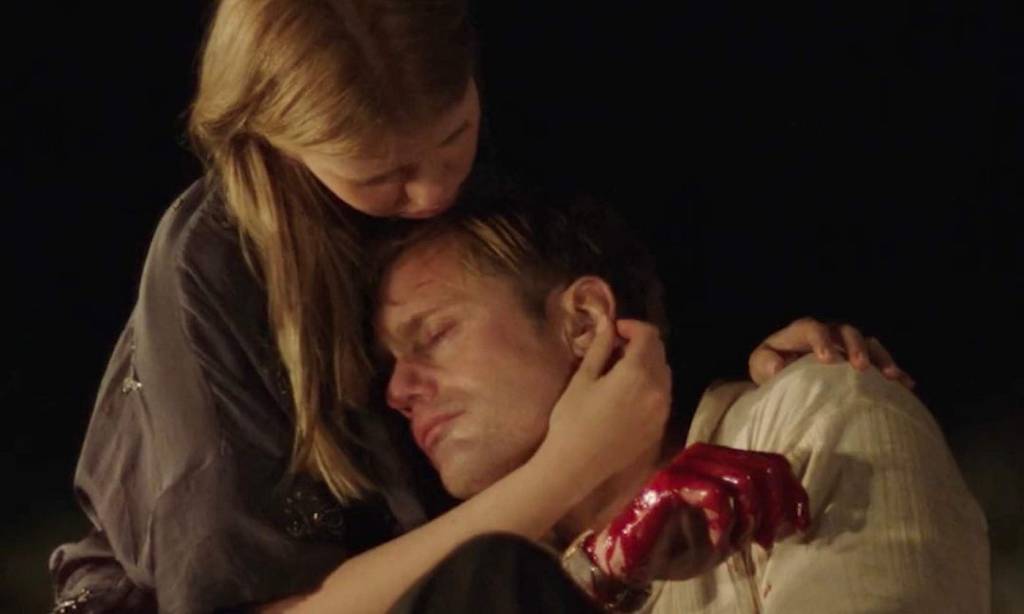
23. Infinity Pool
Brandon Cronenberg came into his own as a filmmaker with the hallucinatory nightmare that is Infinity Pool. Initially predicated on the worst anxiety for wealthy tourists eager to exploit the natural beauties of impoverished nations, the film at first glance is the legal hell of what happens when an author named James (Alexander Skarsgård) ventures out of the artificial luxuries of his resort vacation and into the local areas where he accidentally kills a man in a hit and run.
What makes Infinity Pool so twisted, though, is how it transforms that opening horror into something far more sinister and primal. It turns out the film’s fictional country has mastered the science of cloning—with real-life replicas that maintain all your memories, at that!—and they use it as a veritable “get out of jail free” card for wealthy tourists. What James did is a capital offense, but he can watch his clone be executed in his place for a price. And that’s just the tip of the iceberg as he discovers other tourists like Gabi (Mia Goth at her most blithely perverse). She’s a fawning fangirl of James’ book, and she teases him that she comes to this country in order to play GTA for real. An aloof and ultimately Freudian mingling of sex, death, and self-destruction, Infinity Pool is a film that glistens on its surface, but underneath awaits jagged teeth.
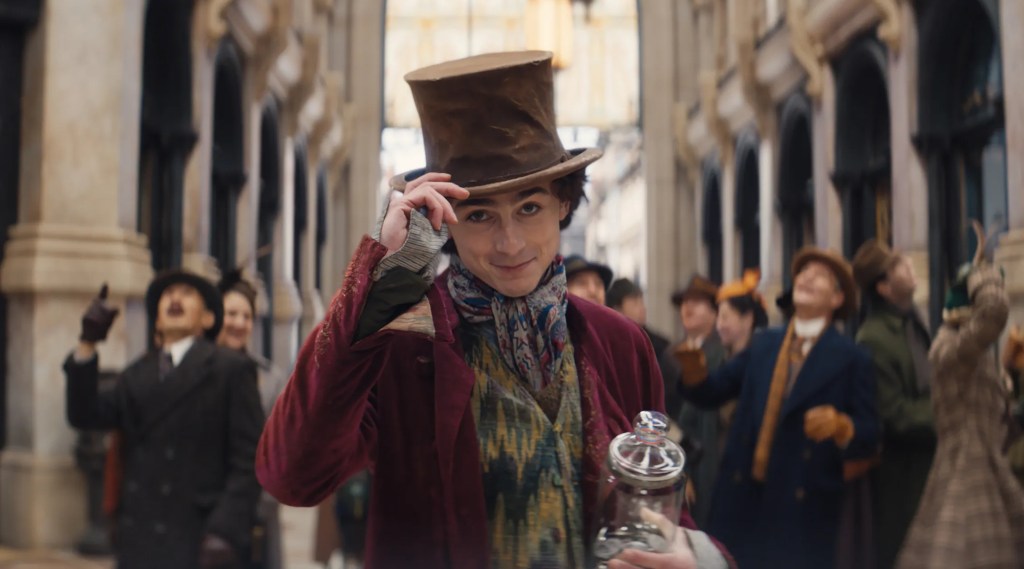
22. Wonka
The most Christmasy movie on this list isn’t set at Christmas, but after watching Wonka we can see a whole new Christmas tradition emerging. A prequel to the beloved Gene Wilder film Willy Wonka and the Chocolate Factory, and starring flavor of the month Timothée Chalamet, this franchise-extension might sound on paper a little bit like a cynical cash grab. But when you add director Paul King into the mix, all bets are off.
This is the man who made Paddington 1 and 2, the least cynical family films of their time. Chalamet as young Wonka is winsome. He’s a great singer and dancer, and the tracks written for the film by The Divine Comedy’s Neil Hannon are catchy and at times poignant, as Willy meets orphan Noodle (Calah Lane), trapped in a Dickensian boardinghouse run by the despicable Mrs Scrubbit (Olivia Colman chewing the scenery with her grim false teeth). Wonka is shamelessly good natured, clever, and colorful, all while remaining faithful to Dahl’s novel. It’s also a veritable who’s who of British comedy talent, featuring familiar faces from Ghosts, Peep Show, and more. A sweet treat.
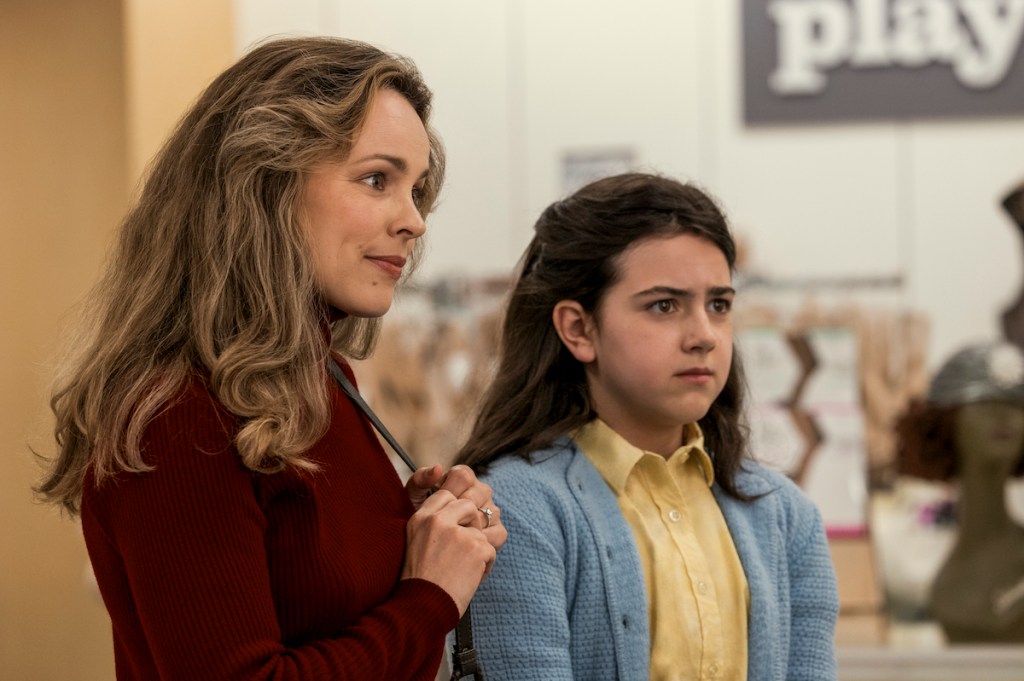
21. Are You There God? It’s Me, Margaret.
Unfortunately this adaptation of author Judy Blume’s seminal 1970 coming-of-age novel from director Kelly Fremon Craig (The Edge of Seventeen) did not strike a chord with modern filmgoers. In fact, it arguably might have been the canary in the coal mine for a host of other failed 2023 releases banking on nostalgia, like The Flash and Indiana Jones and the Dial of Destiny. And it’s a shame too, since Craig deftly brought the story of Margaret (Abby Ryder Fortson) to life in warm, funny, and poignant fashion, making it timeless while keeping it squarely in its 1970s setting.
Even if the lack of smartphones and social media might have proved too confusing to younger audiences not familiar with Blume’s book, Margaret’s first steps into puberty and womanhood, while dealing with all the usual trials of school, friends, and boys, are still engaging and truthful as ever. Here’s hoping that Margaret, both the book and the film, manages to find new fans again.
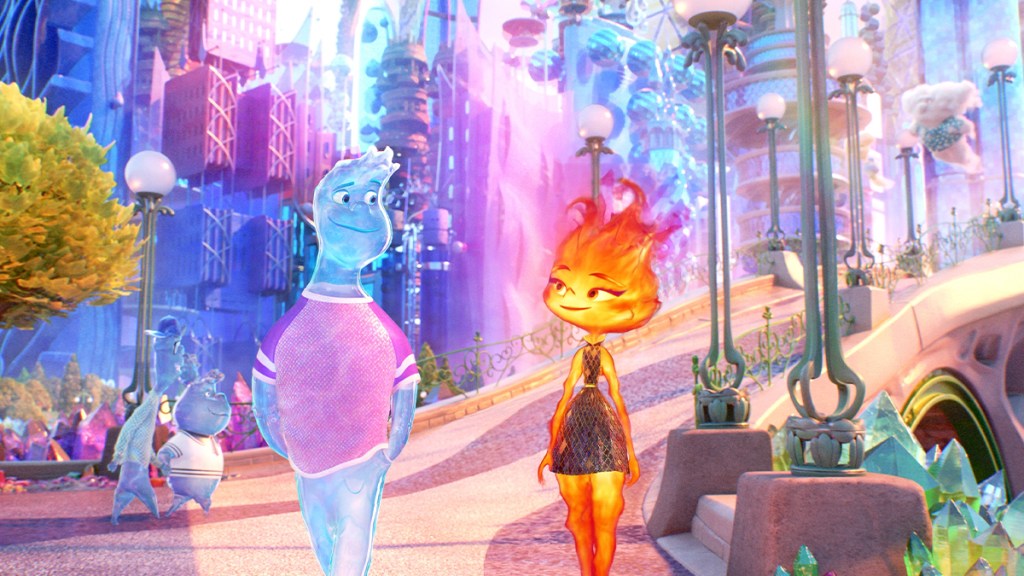
20. Elemental
The box office woes of Pixar these days often obscure what makes the animation house still special when it’s firing on all cylinders: they produce high-caliber fables that work just as well for adults as children. While we wouldn’t suggest Peter Sohn’s Elemental is in the highest echelon of that legacy, it is a genuinely charming love story. A metaphor about a flame-and-water romance may be as subtle a blast from a firehose, but it works and deserved a larger audience than it found.
The picture is set in a fictional world where the four elements—earth, fire, air, and water—are anthropomorphic beings trying to make it in the big city. So basically it’s modern day New York City with water-people making up the one percent and upper middle-class, and fire-people representing mostly foreign-born immigrants relegated to the outer-boroughs. It’s there that Ember (Leah Lewis) grows up being taught to resent water folks until an adorkable one working for the city, Wade (Mamoudou Athie), falls in love with her, and she’s kind of smitten too. It’s a simple and winning American immigrant story.
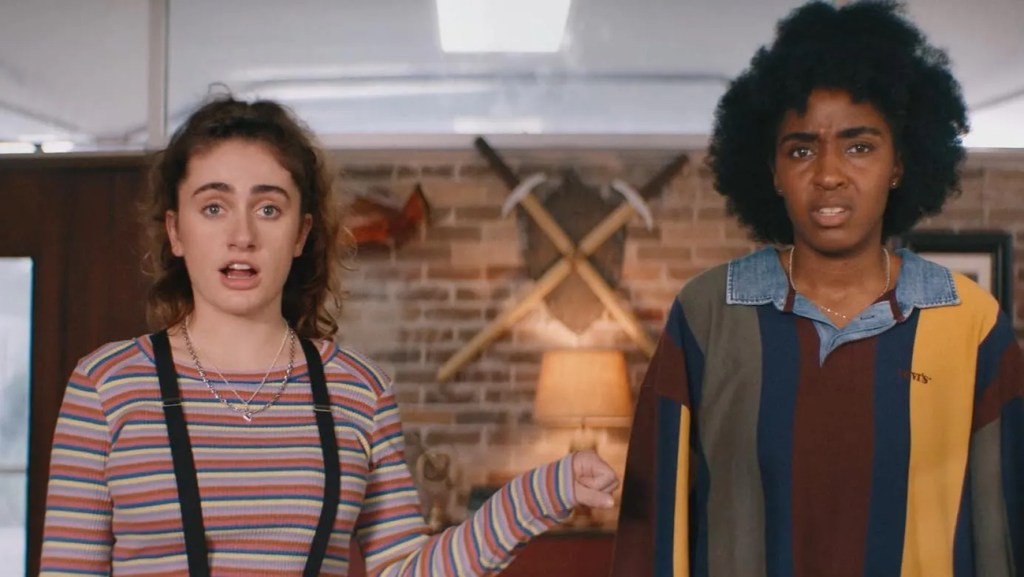
19. Bottoms
Emma Seligman and Rachel Sennott’s Shiva Baby was one of the real charming surprises during the hell year that was 2020: a Gen-Z comedy of cringe that reminded you why it was, in fact, horrifying to be surrounded by friends and family you hate. So seeing the pair team up again, and for a movie with a budget that could afford more than one location this time around, seemed like instant good sense. Nonetheless, the sheer demented ingenuity of Bottoms still caught us by surprise when we caught it at SXSW in March, and its reputation has only grown since. After all, how many other comedies feature an LGBTQ+ after-school fight club?
A series of mirthful sketch-comedy bits derived from tangibly real memories of high school anxiety, Bottoms blends the satirical snark of Heathers with the oversaturated sunshine of Bring It On. The film’s vivacious energy makes the movie dance between raindrops (or at least flecks of blood splatter). It also features a terrific ensemble led by Sennott and Ayo Edebiri as a pint-sized chatterbox teenager with the neuroses of a wine mom. It’s daft, delightful, and has Marshawn Lynch as a gym teacher so out of touch, he doesn’t mind his students are beating the shit out of each other between football games. Give it a watch or three.
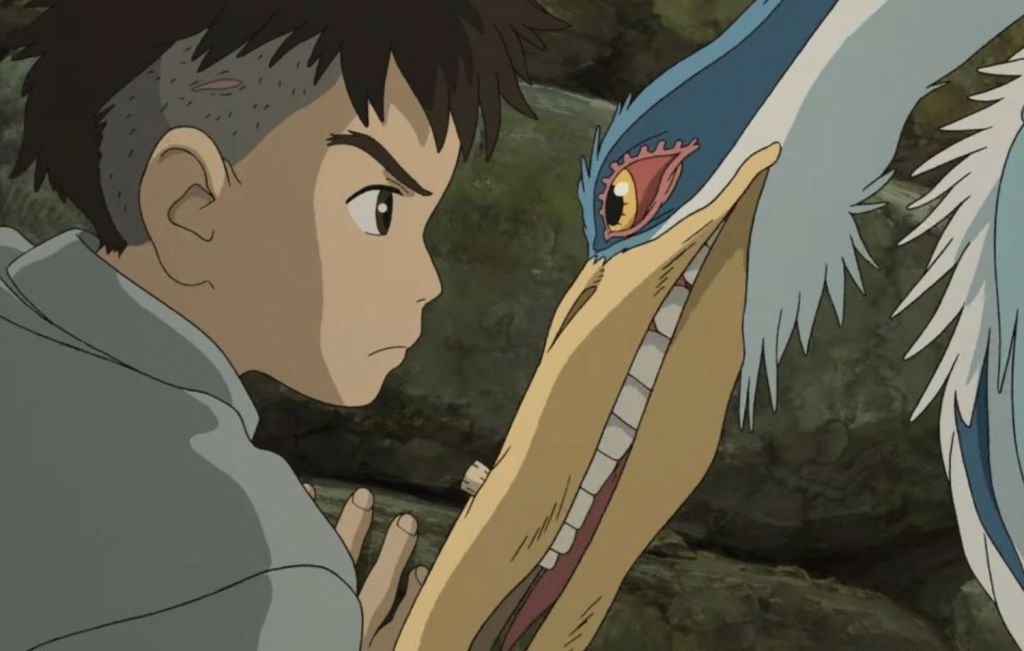
18. The Boy and the Heron
For pure visual splendor, there is still no artist like Hayao Miyazaki working in cinema today. And fortunately, after threatening us with retirement following the release of The Wind Rises, Miyazaki has returned to make another final film for Studio Ghibli via The Boy and the Heron. Possibly Miyazaki’s most beatific and bucolic work, The Boy and the Heron is a visceral wonder that marries the pure escapism of Frank L. Baum’s Oz with Miyazaki’s own fascinations about pastoral bliss and the childhood scars which linger.
The boy of the title is named Mahito Maki (Soma Santoki), a gloomy adolescent who lost his mother in a Tokyo fire bombing during the Second World War. Afterward, he is sent to the countryside where he meets his father’s new intended bride… and the eponymous gray heron who is most definitely more than meets the eye. Initially a kind of Gothic coming-of-age yarn, The Boy and the Heron slow boils its way into pure visual and aural wonderment. After Mahito follows the bird into a closed-off tower, he discovers not only family secrets but a magical world that proves there is still nothing more astonishing in cinema than what can be conjured by a pencil and paper.
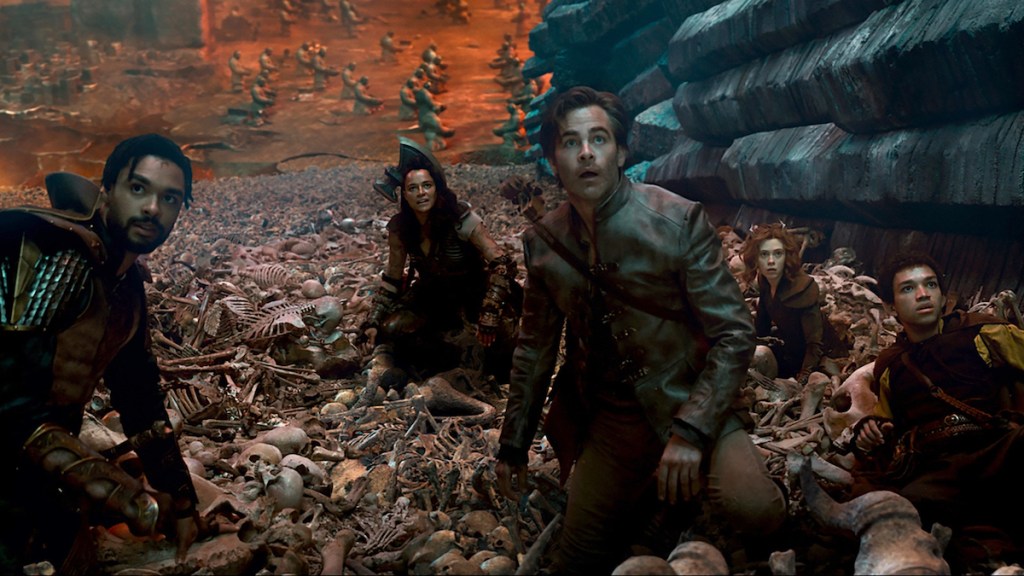
17. Dungeons & Dragons: Honor Among Thieves
For decades, Dungeons & Dragons as a brand has been associated with nigh impenetrable layers of esoteric geekery and (in some incredibly sheltered circles) satanic occultism. So leave it to the directors who gave us Game Night to crack the code for a D&D movie by turning it into an easy-breezy comedy in the vein of Stardust and The Princess Bride. A genuinely funny romp, Honor Among Thieves both respects the nerdy minutiae of its source material while still being able to glance at it sideways.
A big reason this is made possible is a cast which conjures a wall-to-wall charm offensive. They’re led off by the appropriately judged oil and water dynamic between Chris Pine and Michelle Rodriguez, but elsewhere the movie also scores points by presenting Hugh Grant at his smarmiest and Regé-Jean Page as a traditional D&D paladin character. He is thus simultaneously dashing and insufferably pedantic, depending on your disposition (which s a little bit like the tabletop game itself). It all melds into a spell that might be fleeting, but it’s nonetheless enchanting while up there on the screen.
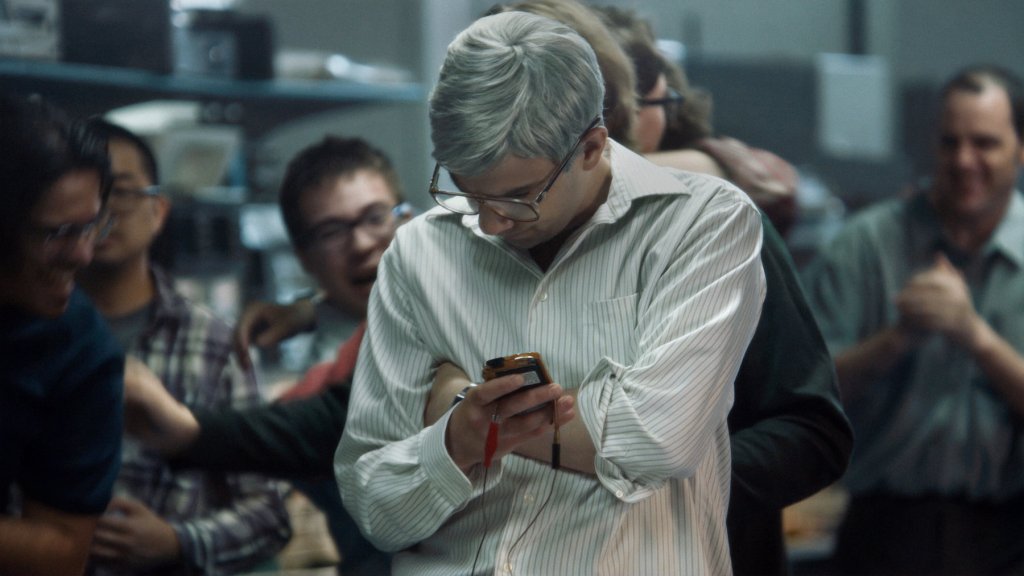
16. BlackBerry
When it comes to the wavelet of films that came out this year retelling the origin story of, uh, brands (a list that includes Air, Tetris, Pinball, Flamin’ Hot, and, arguably, Barbie), this tiny Canadian indie made for $5 million may be the best of them all. Jay Baruchel is magnificent as Mike Lazaridis, the deeply nerdy, socially awkward genius who manages to create the BlackBerry and usher in a new era of mobile personal communication. Writer/director Matt Johnson plays his partner/best friend while Glenn Howerton is incendiary as Jim Balsillie, the businessman they hire as CEO of their company (Research In Motion), whose aggressive tactics both lift them up and ultimately bring them down.
Sharply written, highly intelligent, and incisive in its view of how money and greed can poison creativity and imagination at every turn, BlackBerry is also often hilarious, affectionately poking at both nerd culture and capitalist piggery. It’s probably the most fun you’ll have watching this kind of thing. With the BlackBerry itself now long gone, you won’t get the sensation of watching a two-hour commercial.
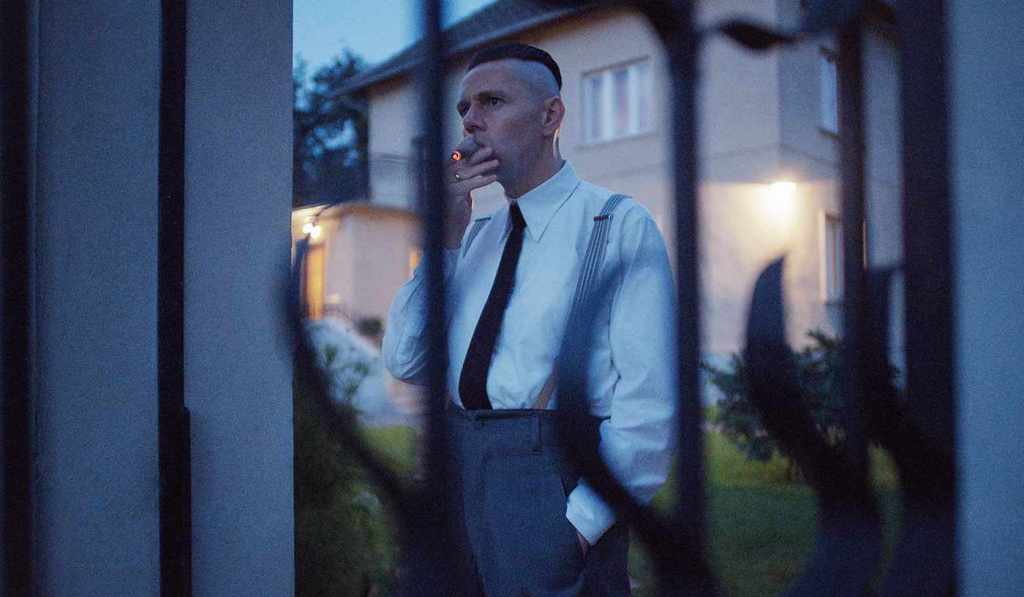
15. The Zone of Interest
Jonathan Glazer’s formidable film about the Holocaust might be called The Zone of Interest, but “the banality of evil” would be just as apt. In a stark step away from most cinematic depictions of the incomprehensible annihilation of six million Jewish people—and millions more the Third Reich deemed undesirable—we never once step foot inside a concentration camp despite the film being set entirely around Auschwitz. The systematic slaughter of thousands is occurring, and it is impossible to not notice. You can occasionally hear the sounds of screaming or a muffled gunshot; the dog barks at far angrier hounds on the other side of a wall; and, of course, there is that billowing cloud of black smoke wafting in the winter sky as German children play.
The Zone of Interest focuses not on the atrocities but rather the people who made them happen, either directly or by turning a blind eye. The central character is Rudolf Höss (Christian Friedel), an SS officer and commandant of the Auschwitz concentration camp where he spearheaded the introduction of gas chamber showers. However, you only hear him speak about that in passing over the phone. Instead he seems to be a man who loves his wife Hedwig (Sandra Hüller), dotes on his children, and truly adores his prized horse. Hedwig is also fully aware of what her husband does (how can she not be?), but his ingenuity pays for the home and garden she always dreamed of raising her children in. Theirs is an idyllic life.
This is a portrait of how humans normalize evil until they are either oblivious to it or enjoy profiting from it. So if you do not see echoes of how the modern world of today normalizes hate, totalitarian ideas, and the persecution of minorities… well you might be already willfully blind.
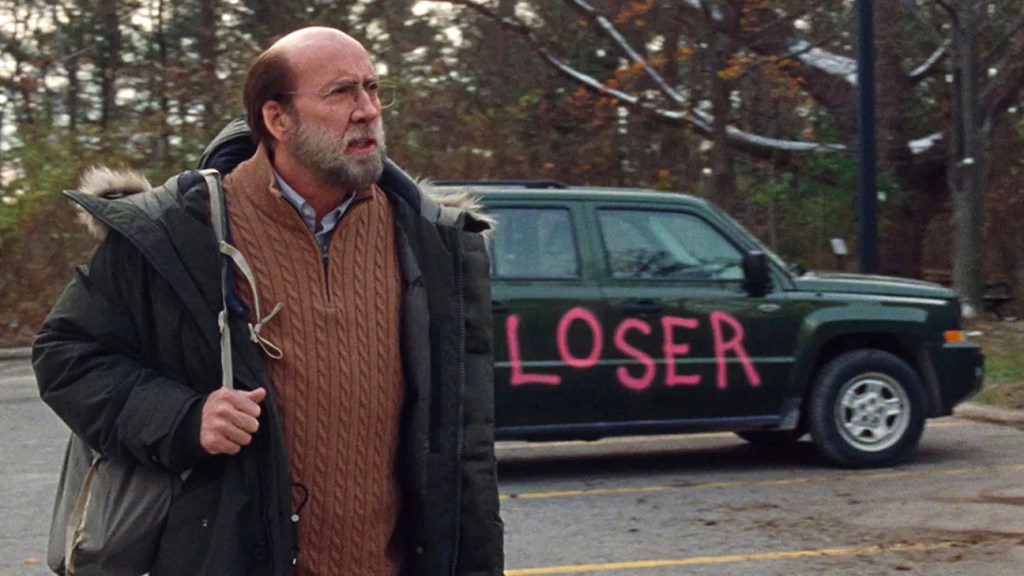
14. Dream Scenario
There’s something so malevolently cruel about Kristoffer Borgli’s Dream Scenario that it circles back around to funny. A Kafkaesque take on social media fame—and the swiftly followed infamy it usually brings—the film follows Professor Paul Matthews (Nicolas Cage), a remarkably unremarkable man. Prof Matthews is neither the most loved instructor at his university nor the greatest thinker in his field. In fact, he’s a schmuck who is ignored by everyone but his devoted wife Janet (Julianne Nicholson) and their two adolescent daughters. So when the whole world inexplicably starts dreaming about him, it’s not only bizarre, but kind of flattering for a guy who just wants to be appreciated and recognized. Imagine how it must feel, however, when those dreams he cannot control turn into nightmares?
A surrealist riff on our need for attention, and how that has mutated into an industrial cancel culture complex, the film works in large part because of how pathetically needy Cage makes himself. Donning a bald cap and an off-putting smile that belies deep-seated passive aggression, the performance is at once well-cultivated and outright caricature. It teases a quasi fatalism wherein someone invited their own destruction. In this way, the film provides a portrait of our times: a nebbish figure whose simultaneous timidity and vanity makes him incapable of doing anything but succumb to the latest hashtag.
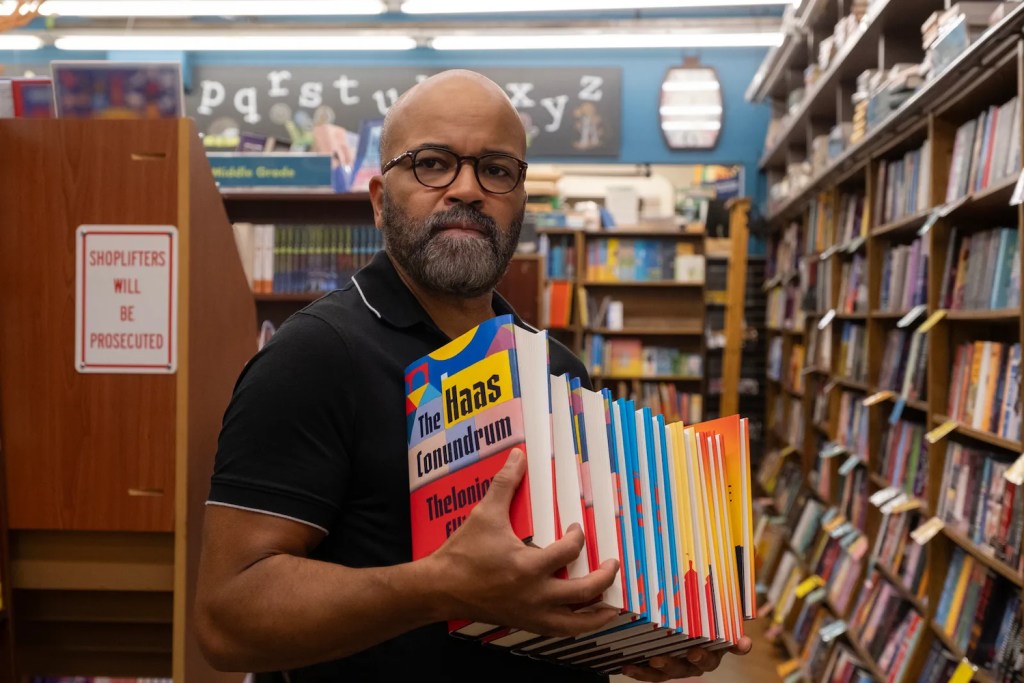
13. American Fiction
Jeffrey Wright is one of the finest working actors of his generation, with a career that spans from the sober, exacting conscience of Tony Kushner’s Angels in America to Ang Lee’s visage of the Civil War in Ride with the Devil. Yet an entire generation of moviegoers might only associate him with (terrific) supporting work in genre fare, be it James Bond or Batman. Hopefully, this changes after Wright turned in the performance of his life in American Fiction, a scathing satire of how commercial forces (read: white people) capitalize on and commodify Black voices, even when they’re trying to be an ally.
An impressive directorial debut for helmer Cord Jefferson, who also adapts Percival Everett’s novel of the same name, American Fiction initially appears to be a simple character study of Thelonious “Monk” Ellison, a privileged college professor and author who writes erudite novels, and who has sunk into middle age with an ever-growing grumpiness. Yet he stumbles into the punchline of our moment when—after being hectored by his agent to write a “Black book” that sells—he pens as a joke, and under a pseudonym, the most insipid, cliché-ridden collection of Black pain tropes ever conceived. He even eventually titles it Fuck. It becomes a bestseller.
Jefferson and Wright nimbly lampoon how well-meaning white guilt still marginalizes Black voices into a monolith and caricature. However, they also use it as a way to layer in a delightful dramedy about a highly specific Black American experience that cannot be reduced to a four-letter word when you grow up among the academia and tourists of Boston’s North Shore. Also a terrific ensemble piece that includes excellent supporting work by Tracy Ellis Ross, Issa Rae, and Sterling K. Brown as Monk’s newly out and proud gay brother, American Fiction has some hard, and hilarious, truths.
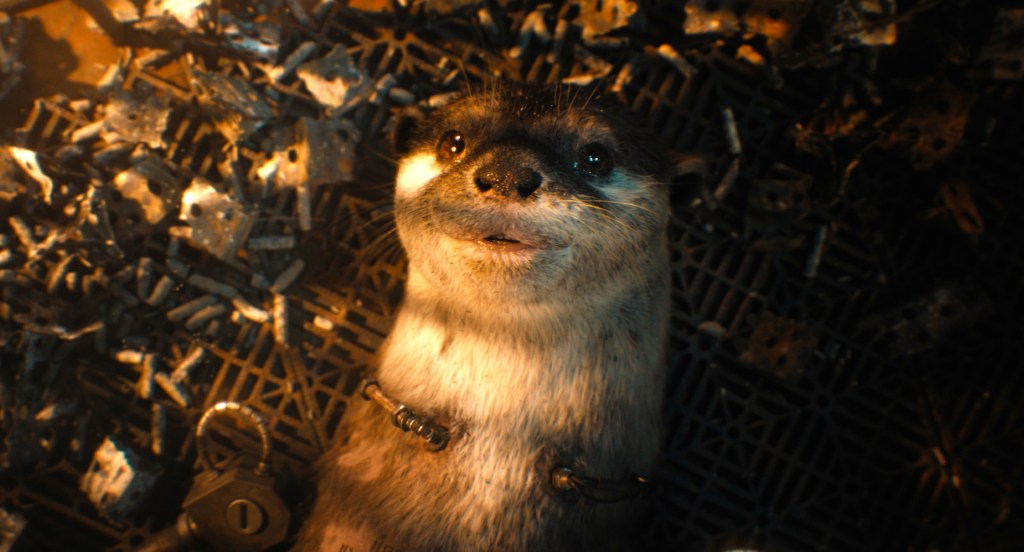
12. Guardians of the Galaxy Vol. 3
In some ways it’s a wonder this film made it to the screen intact given the firing and rehiring of writer-director James Gunn, the further delays in filming, and Marvel Studios’ well-documented and overall travails in navigating a post-pandemic (and post-Endgame) box office. But amazingly, Guardians Vol. 3 not only arrived to lift Marvel fans’ spirits, but ended up being a stirring, highly emotional, and beautifully rendered finale to the MCU’s most quirky trilogy of films.
Perhaps the most personal of Gunn’s films yet, Guardians of the Galaxy Vol. 3 focuses on Rocket Raccoon’s dark origins (in a manner that gets quite disturbing at times), paralleling his story with the challenges faced by his fellow Guardians as they battle to save Rocket’s life and defeat the terrifying High Evolutionary. As unsettling as Rocket’s journey gets, his (and the other Guardians’) eventual transcendence provides the film with the deep empathy for our heroes that has seemingly been harder to find in other recent MCU offerings. All this, plus Gunn’s deftness in keeping the essential sweetness of the team’s cracked dynamic front and center, makes Vol. 3 an undisputed high point of the MCU’s uneven Phases 4 and 5.
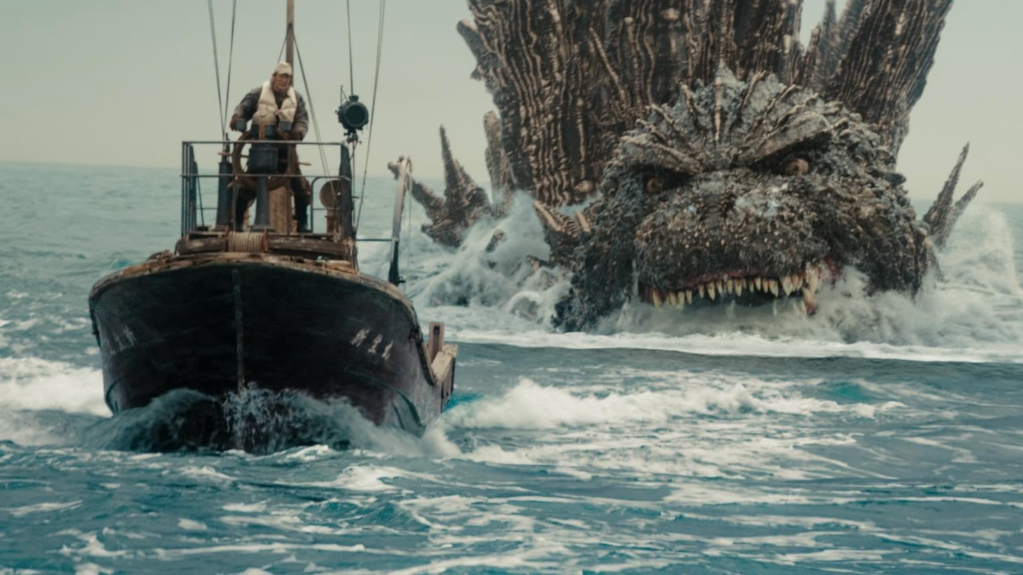
11. Godzilla Minus One
Crafting an unintended rebuttal to Christopher Nolan’s Oppenheimer, writer-director Takashi Yamazaki took the assignment of making Toho Studios’ 33rd Godzilla picture seriously—and in the process got all of us to do the same. A case can seriously be made that Godzilla Minus One is the best movie about the rampaging lizard ever produced, not least of all because the emotional stakes are just as overwhelming as the senseless destruction.
By following an adopted family trying to make ends meet in the ruins of Tokyo circa 1946, Minus One puts the plight of post-World War II Japan front and center, unpacking the original Godzilla of 1954’s implied themes of trauma from nuclear holocaust, as well as the shame that stems from an inglorious cause that ended in total loss and defeat. Those are the horrors already facing the film’s central character, a kamikaze pilot who refused to kill himself, and his surrogate wife and daughter. Only then does the Big G show up. And when he does, the film will make you finally fear for the ants racing to stay alive beneath his feet.
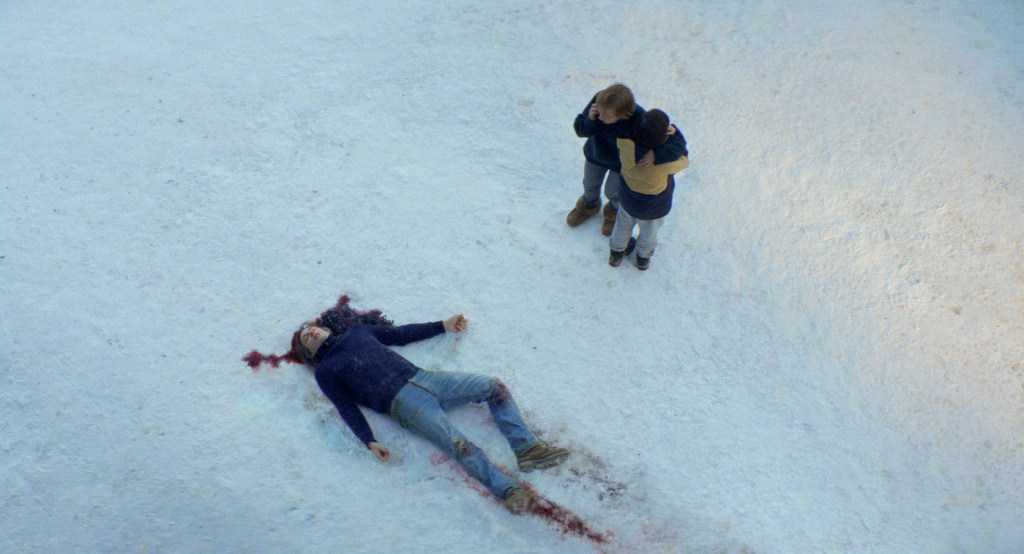
10. Anatomy of a Fall
At a glance, Justine Triet’s Palme d’Or winner, Anatomy of a Fall, appears as icy as its setting in the French Alps. But if you could actually put your hand to it, the thing is so heated it scalds. This is because the deceptively simple story of a legal investigation into the death of a man named Samuel (Samuel Theis), who inexplicably fell from a window in his mountain home, slips into something far more elusive and truly puzzling: marriage and the mysteries therein.
The French legal system is quick to place the blame at the feet of Samuel’s wife Sandra (Sandra Hüller in a devastating performance which keeps you both at arm’s length and riveted). She’s a successful author, and the breadwinner, who was in the house when her husband’s life ended. However, rather than a criminal investigation, the trial becomes more a one-sided dissection of their marriage, and all the contradictions and hidden intrigues that do not bear intense rationalization or legalese parsing. It is Hüller’s breathtaking performance as her private life is laid bare before the world, and her blind eight-year-old son (Milo Machado Grader), who discovered the body of his father, that makes this legal drama both a thriller and a tragedy. Either way, there are no easy answers in the snow castle Triet carefully constructs atop a frying pan.
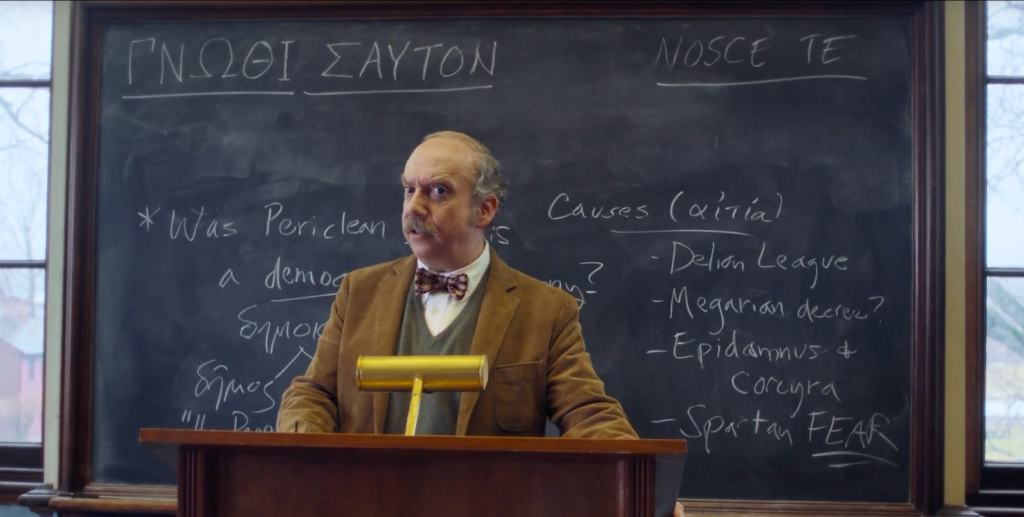
9. The Holdovers
With his latest feature, director Alexander Payne returns to what have become dual motifs in his work: the awkward murkiness of adolescent life and sad sacks played by Paul Giamatti. Both elements are refined to tragicomic sweetness in The Holdovers. A film set during a snowy and lonely Christmas season for young Angus Tully (Dominic Sessa), a rich kid who’s been abandoned by his newly remarried mother over the holidays as she vacations without him, and his stringent history teacher who was always lonely, Mr. Hunham (Giamatti), The Holdovers uses its festive framing to practically crowbar humor and good cheer out of what could’ve been a far colder and less beguiling film in lesser hands.
In truth a stealth three-hander, as both Tully and Hunham come to take a new appreciation for the kitchen chef Mary (Da’Vine Joy Randolph) who has agreed to stay on and feed these leftovers after enduring her own far greater tragedy, The Holdovers is a soft and sincere character study about facing the wrong turns we take in life—and having the courage to turn again after looking back. Also in addition to all three central performances being knockouts, David Hemingson’s script is laugh-out-loud funny.
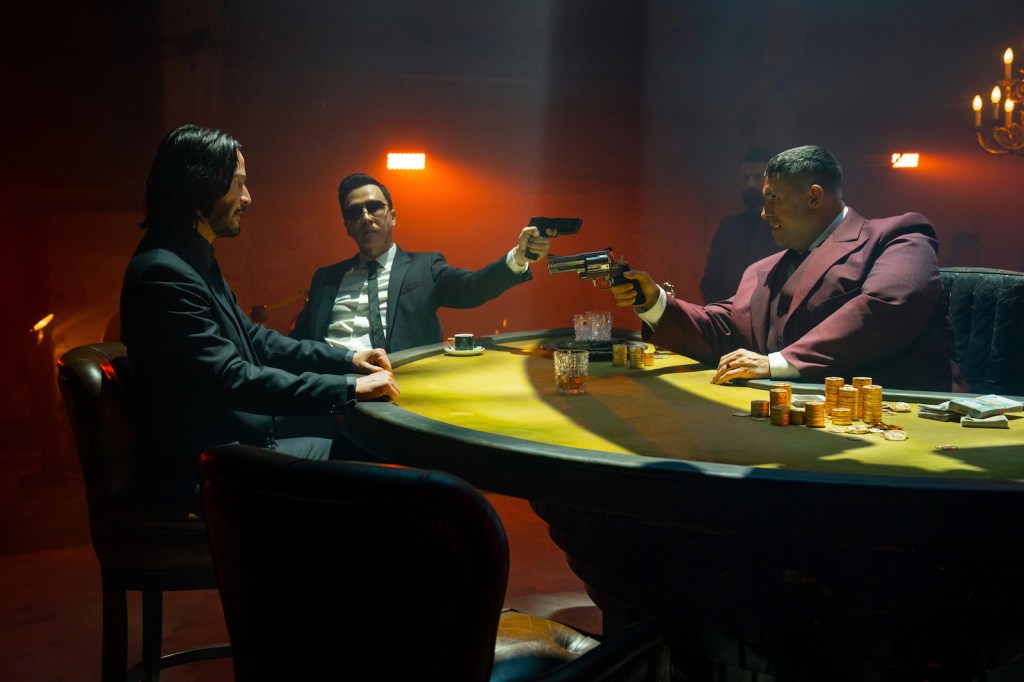
8. John Wick: Chapter 4
John Wick: Chapter 4 is a grand symphony of gratuitous movie violence. The first trio of films in the saga were certainly spectacles unto themselves as well, but for the first Wickian adventure since the pandemic, director Chad Stahelski and star Keanu Reeves surpassed all expectation by delivering an honest-to-Lean epic that is nearly three hours in length and begins with an homage to Lawrence of Arabia where John chases down his prey at sunrise across the desert while still wearing that finely tailored three-piece suit.
Before Chapter 4, the Wick flicks were beginning to risk descending into self-parody as the story of John’s journey into a surprisingly bureaucratic and genteel underworld became ever more ludicrous. Yet there is such an operatic majesty to what feels like the finale of John’s story in Chapter 4 that it elevates the whole series, not least of all because this one has the best action sequences. Adding Donnie Yen as a secondary protagonist has that effect, and the final 45 minutes of the film where Reeves and Yen paint the streets of Paris red is an all-timer for martial arts gun-fu. If this really is the end, John earned the rest.
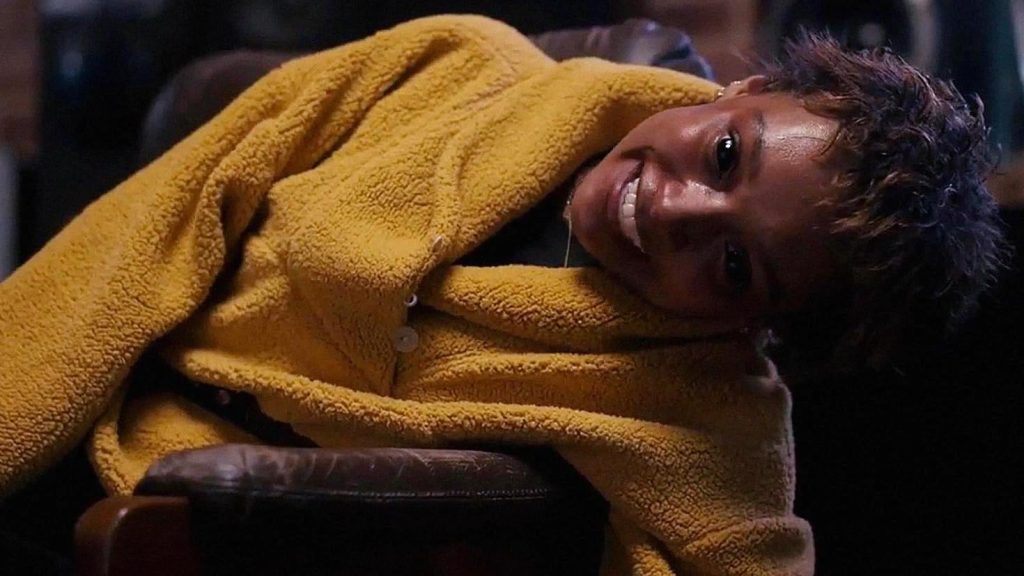
7. Talk to Me
Young people do stupid things. Sometimes that involves booze, and sometimes that involves drugs. Heck, I’m old enough to remember when crank calls were a thing friends did in the ‘90s. But demonic possession? That’s a new one, and it’s used to appropriately chilling effect in the first feature from Australian brothers Danny and Michael Philippou.
In the film, lonely and thoughtful teen Mia (Sophie Wilde) is going through some tough times at home. It’s why she spends so many nights in the house of her friend Jade (Alexandra Jensen) and Jade’s kid brother Riley (Joe Bird). But the lonelier you are, the more you want to fit in, and when some neighborhood kids reveal that they’ve discovered a new high—seances where you invite the spirits of the dead to possess your body for a few minutes—Mia’s game for laugh. By the end of Talk to Me, you will not be laughing. In fact, you’re probably reeling from the most visceral gut punch we’ve had at a cinema this year.
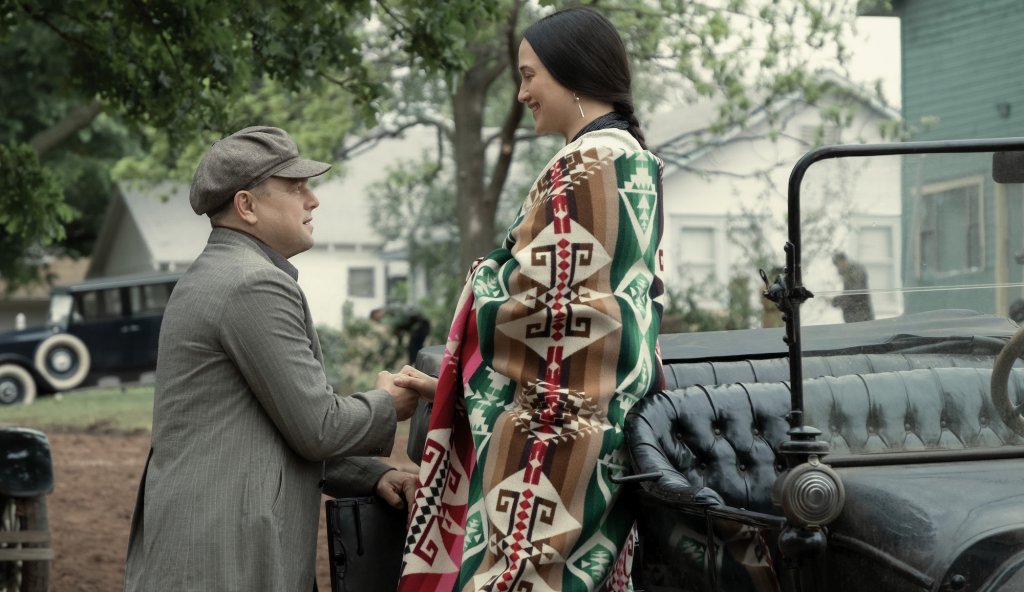
6. Killers of the Flower Moon
Martin Scorsese and co-writer Eric Roth not so much adapt David Grann’s searing nonfiction work, Killers of the Flower Moon, as they excavate it to find the bedrock sin of American racism buried at the very foundations. They then turn that elemental bigotry into a three and a half hour poem of greed, avarice, and regret. The film is long, but it’s sprawling size still isn’t enough to soak in the complete totality of the evil inflicted on the Osage Nation, an Indigenous people who briefly became the richest folks in the world per capita in the early 20th century due to the discovery of oil on their lands. This meant they became targets yet again for bottomless white greed.
The film is primarily told from the perspective of envious eyes, including Leonardo DiCaprio as a dim-witted tool named Ernest and a chilling Robert De Niro as his uncle who orchestrates a conspiracy of mass murder. It’s the best performance De Niro has done in decades. Yet the movie belongs to a luminous Lily Gladstone as Mollie, the Osage wife of Ernest and heart of the film as she slowly comes to understand the full breadth of betrayal in her own household. There are many ways to approach this material, and Scorsese’s chosen path is one that follows you out of the cinema and lingers long afterward.
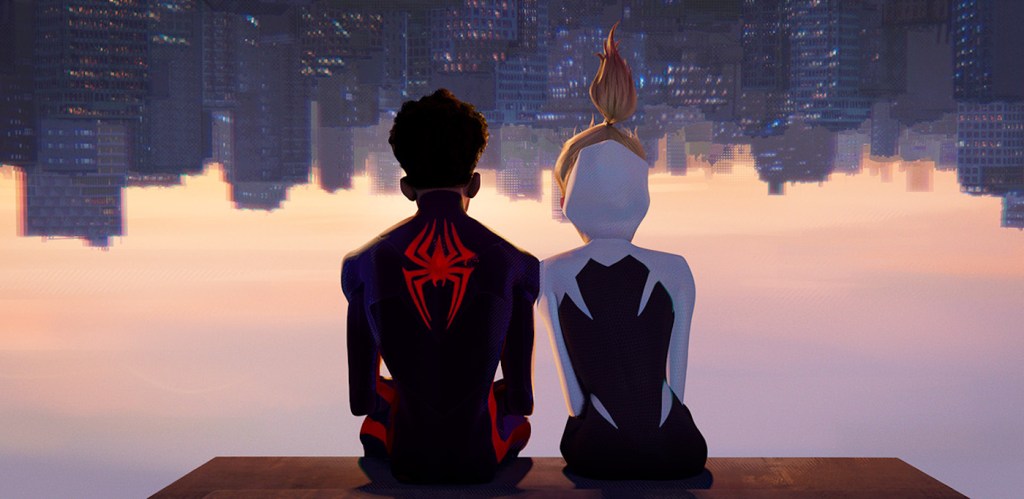
5. Spider-Man: Across the Spider-Verse
If 2018’s Spider-Man: Into the Spider-Verse was a profound game-changer for both animated films and the superhero genre, then this mind-blowing sequel introduces us to a whole new game entirely. Spider-Man: Across the Spider-Verse ups the ante in every way: It deploys a massive new collection of Spider-Mans and their universes—each rendered in their own dazzling aesthetic—while upping the emotional stakes for Shameik Moore’s Miles Morales and Hailee Steinfeld’s Gwen Stacy. The film tells a multiverse story that is both epic in scale and intimately character-driven.
Instantly joining the ranks of films like The Dark Knight, The Empire Strikes Back, and Toy Story 2 as one of the finest sequels of all time, Across the Spider-Verse literally explodes with imaginative visuals and ideas, to the point where it strains to contain them all in the frame. Even its cliffhanger ending feels earned instead of forced. At a time when the superhero movie faces its most challenging headwinds in 25 years, Across the Spider-Verse proves that the genre has not yet run its course.
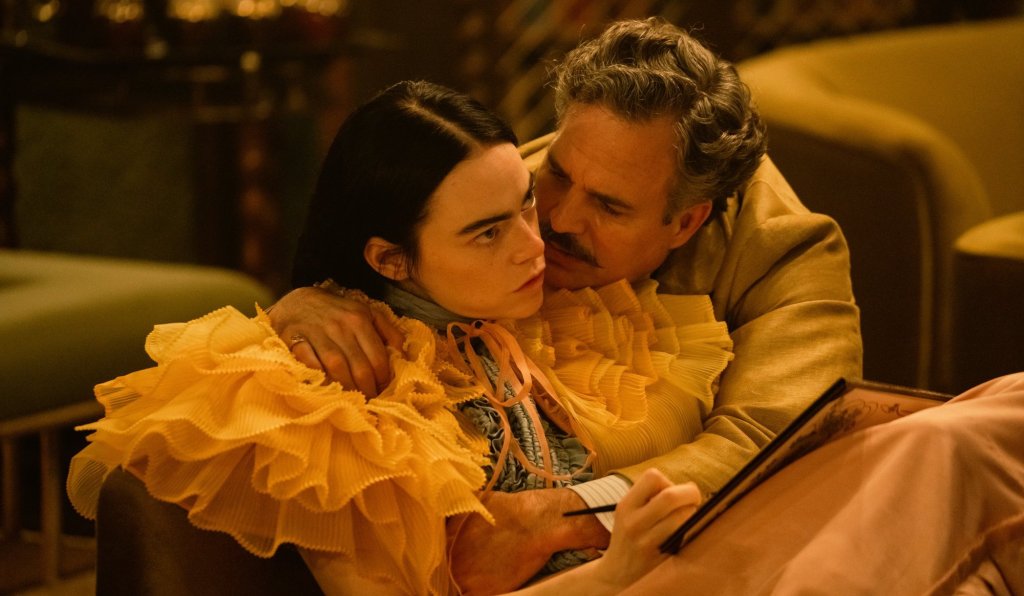
4. Poor Things
Director Yorgos Lanthimos, screenwriter Tony McNamara, and star Emma Stone’s reunion after The Favourite is the best Frankenstein movie we’ve had in decades. Adapted from Alasdair Gray’s novel of the same name, Poor Things is sumptuously decadent and happily transgressive as it finds dark comedy in the following setup: A mad scientist (Willem Dafoe under a thick coat of makeup) brings a random suicide he discovered back from the dead… but only after he’s put the brain of the unborn fetus in her body into the full-grown woman’s skull. It’s a macabre setup which the film nakedly turns into a satire of the patriarchy as mental newborn Bella Baxter (Stone) breaks away from the men who created her in order to discover what it means to live, particularly as a woman.
The show-stopping draw of the film is Stone’s electric performance as Bella; it’s fearless, leaping without a net stuff that balances between extreme physical comedy and tortured emotional complexity. It also, frankly, courts offending some audiences given how bluntly it embraces sex as part of the human experience. But behind all the perversity is a layered work that is surprisingly gentle for Lanthimos. It doesn’t hurt, either, that the film is a feast for the eyes with jaw-dropping costumes and production designs, which are captured in exquisitely atonal cinematography by Robbin Ryan. It’s a dirty little freak of a movie, and we suspect Mary Shelley would be proud.
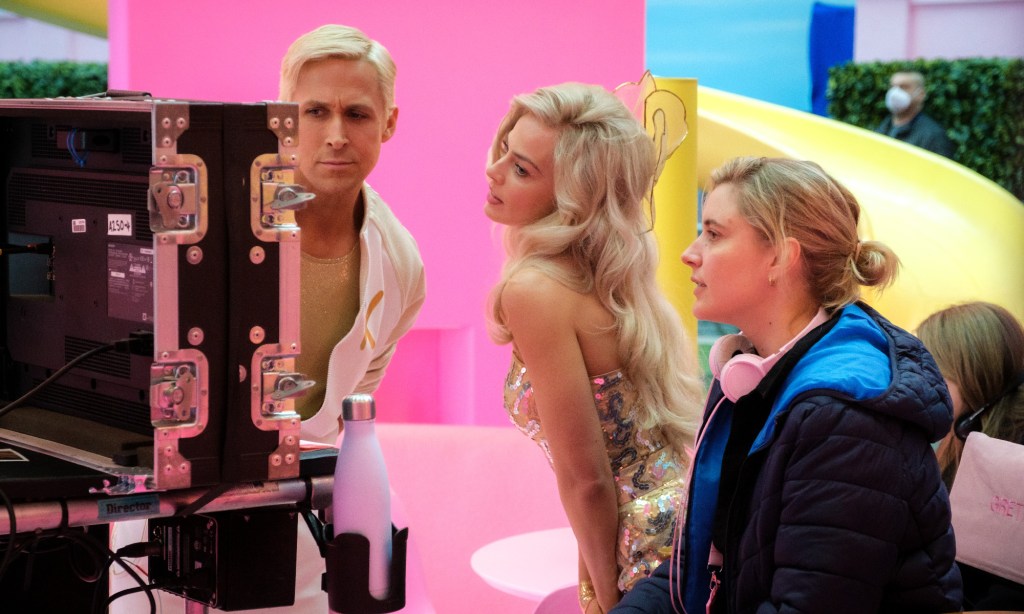
3. Barbie
Greta Gerwig‘s Barbie is not only the most profitable movie of the year, it’s also one of the most colorful, nuanced, and purely enjoyable experiences you could have in 2023. Powered by tremendous hype, in part related to sharing a release date with Oppenheimer, as well as some extremely shrewd marketing, cinemas were sold out to audiences wearing pink in solidarity with the titular doll. Cynical product placement? Nope, this is a much smarter film than that. Transformers, it is not.
Margot Robbie plays Barbie. Or rather, one of many Barbies who live in the candy-colored idyll of Barbieland. Meanwhile the Barbieland Kens are somewhat superfluous, relying on Barbie for self-esteem. But when stereotypical Ken and Barbie enter the real world, it’s a rude awakening for Barbie. Not anti-male, but definitely anti-the-patriarchy, Gerwig’s vision makes for a gently feminist film that’s also very funny and palatable for youngsters and grown-ups alike. Sporting a massive ensemble cast, throwing in cultural references left, right, and center, Barbie almost demands repeat viewings. We’re confident this’ll be a fan favorite for the ages.

2. Past Lives
Every so often, a new filmmaker emerges with an astonishing amount of confidence and fully formed vision. Writer-director Celine Song is one such filmmaker, and Past Lives is one such film—a shimmering and aching love story that has the maturity to ponder about the roads not taken and the loves never fulfilled.
In a decade where everything from superhero movies to Oscar winners are using the multiverse as an allegory about the choices we make in life, Past Lives removes the metaphor by examining what that anxiety really is for two people living without artifice. Nora and Hae Sung were childhood sweethearts while growing up on the streets of Seoul, South Korea, but after Nora’s parents elect to immigrate to Canada, Nora leaves without even saying goodbye. She simply takes one road going up the hill on a sunny afternoon, and Hae takes another that keeps him on his level. The film then jumps several times into the future, revisiting the pair first in their early 20s and then 30s when they reconnect time and again. In each reunion, they’re painfully curious about how the other’s life turned out—and implicitly searching for what might’ve been, could be, and never will come.
This is an exquisitely acted and layered film that has a patience that comes from lived wisdom, as well as perhaps regret. Song takes her time, contrasting the choices and cultures which shape both characters. What hangs in the air over every scene though are questions that Past Lives has the grace to know cannot be answered.

1. Oppenheimer
After a quarter-century in the business, Christopher Nolan appears to have finally gone thermonuclear in what we consider to be one of his very best films. Oppenheimer is a biopic about J. Robert Oppenheimer, the so-called father of the atomic bomb. As played by Cillian Murphy, however, the scientist takes on an operatic level of tragedy as he rushes into building the power of the gods for his government without ever fully considering the world it will unleash until after “the device” has been dropped on civilians in Japan.
Nolan has a long history with tortured male protagonists obsessed with their work (and men who pay only a minimal amount of interest to the women in their lives), but by exploring a real dreamer whose idea may still yet eradicate us all in Oppenheimer, the director and frequent muse Cillian Murphy achieve career-best heights. The film uses a familiar nonlinear structure to make men sitting in rooms talking theoretical physics more tense and visually spectacular than any action movie this year. Oppenheimer is Nolan’s ultimate magic trick, a compelling and thrilling crowdpleaser that confronts viewers with our self-made annihilation.
